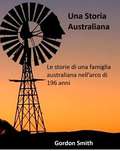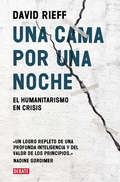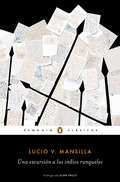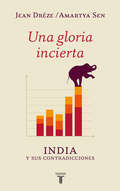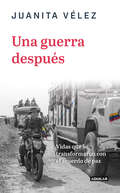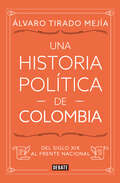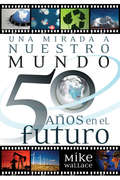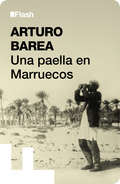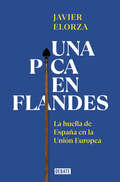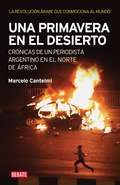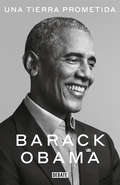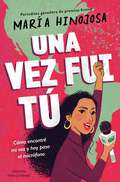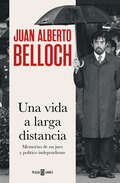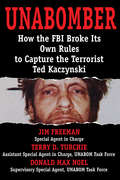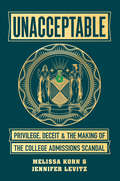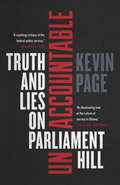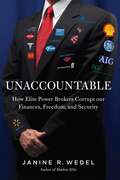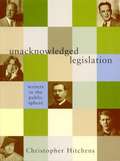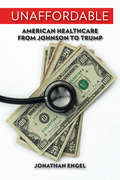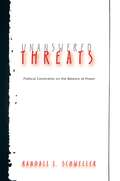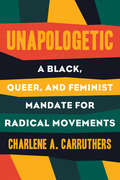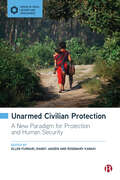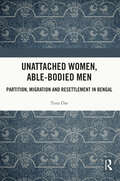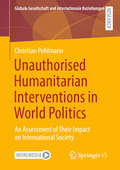- Table View
- List View
Una Storia Australiana
by Gordon SmithQuesta è una storia di una famiglia e della loro storia. Questa è la storia di una famiglia australiana la cui storia inizia nel 1808 fino al 1998. • La storia di coraggio e spirito pionieristico. • La storia di disagio e perdita. • La storia infinita di amore e famiglia. Due guerre mondiali e 4 soldati persi .. La loro eredità, insieme a quella del mondo in cui vivevano, li ha resi persone straordinarie. Sebbene questa storia sia basata su persone reali e eventi, la finzione deve essere inclusa per "colmare le lacune" non documentate. Come del resto molti nomi sono stati cambiati e altri eventi sono stati cancellati per quanto riguarda i membri della famiglia vivente. Questa è un racconto della storia dell'Australia che ha colpito la famiglia attraverso le varie generazioni. È una storia che commemora i supremi sacrifici durante la guerra e le difficoltà, mentre allo stesso tempo dà orgoglio alle conquiste della famiglia e del paese.
Una cama por una noche: El humanitarismo en crisis
by David RieffUn libro que deja al descubierto la falsa moral de Occidente en plena era de las crisis humanitarias. Convertida instantáneamente en un clásico tras su publicación original en 2003, esta polémica obra aborda las crisis humanitarias que se han vivido en los últimos treinta años y cómo las organizaciones creadas para intentar proporcionar alivio en un mundo cada vez más violento y peligroso han traicionado su esencia y se han alejado de su propósito original. Testigo de terribles guerras alrededor del mundo, David Rieff describe cómo el Comité Internacional de la Cruz Roja, Médicos sin Fronteras, Oxfam y otras organizaciones humanitarias han dejado atrás el principio de neutralidad política para animar a la comunidad internacional a tomar partido para frenar las guerras civiles y las limpiezas étnicas, y cómo esta vindicación ha tenido costes muy altos: la falta de neutralidad aumenta el riesgo de no llegar hasta las víctimas y, además, implica que poderes mayores puedan usar estas organizaciones con otros fines. Con nuevos textos sobre los retos actuales a los que se enfrenta el mundo de la ayuda humanitaria y a aquellos todavía más graves a los que probablemente tendrá que encontrar solución en el curso de la próxima década, en Una cama por una noche Rieff sigue defendiendo que para que el humanitarismo pueda dedicarse a aliviar el sufrimiento de las víctimas, ha de reclamar su independencia. Reseñas:«Un análisis tan fulminante como estimulante.»The Wall Street Journal «Pragmático, sofisticado y necesario.»The New York Times «Un libro tremendamente lúcido [...]. Un severo y penetrante análisis.»Time «Una llamada de atención para todos los que vemos el humanitarismo como la incuestionable y desinteresada respuesta al conflicto y a la pobreza en este nuevo mileno.»Nadine Gordimer, Premio Nobel de Literatura «Una cama por una noche proporciona un excelente antídoto contra los clichés y las generalizaciones insustanciales que a menudo desdibujan y distorsionan los terroríficos problemas reales que conlleva ayudar a las personas más afligidas del mundo.»Brian Urquhart, ex subsecretario general de las Naciones Unidas
Una excursión a los indios ranqueles
by Lucio V. MansillaEdición definitiva del clásico de Lucio V. Mansilla, con prólogo de Alan Pauls y nota preliminar a cargo de Alejandra Laera. «Si me hubieran dicho que los indios me iban a enseñar a conocer la humanidad, una carcajada homérica habría sido mi contestación. Como Gulliver, en su viaje a Liliput, yo he visto al mundo tal cual es en mi viaje a los ranqueles.» Originariamente publicadas como folletín, en 1870, en el diario La Tribuna, las cartas que componen este libro son el particular relato de la expedición de Lucio V. Mansilla Tierra Adentro y de su encuentro con los indios ranqueles. Con una minuciosidad por momentos cercana a la obsesión, en ellas el autor toma nota de los detalles de la geografía pampeana y describe lúcidamente los hábitos, costumbres y comportamientos del mundo indígena, ese gran Otro de la literatura argentina. Una excursión a los indios ranqueles no solo es la historia del contacto entre dos culturas, sino un clásico que, escrito con anterioridad a la constitución del Estado, supo advertir en la nación todas sus fatales contradicciones. «Pero pronto el desierto empieza a poblarse, primero con los ranqueles, luego con lo que Mansilla hace con ellos, ve en ellos, piensa y escribe sobre ellos [...] forzado a menudo a constatar, no sin perplejidad, las diversas lecciones de civilización que los ranqueles tienen para dar a los cristianos».Alan Pauls
Una gloria incierta: India y sus contradicciones
by Amartya Sen Jean Drèze¿Cómo se explica que mientras la India supera a muchos países en la tasa de crecimiento económico, la calidad de vida desciende por debajo de muchos de los más pobres? <P><P> Las profundas desigualdades, la falta de atención a las necesidades básicas de la población y el inadecuado uso de los recursos públicos generados por el crecimiento económico son algunas de las grandes fallas. <P><P> India no ha sabido revertir sus éxitos en una mejora de las infraestructuras y los servicios públicos: la escolarización y la atención sanitaria siguen siendo muy deficientes, así como el suministro de agua potable y electricidad, el sistema de desagüe y la recogida de basuras. Jean Dréze y Amartya Sen, premio Nobel de Economía de origen hindú, arrojan una mirada solidaria, crítica y despojada de clichés. <P><P>Una gloria incierta contribuye poderosamente al debate sobre un tema de ferviente actualidad hoy en España y en Europa como es el papel del Estado ante las privaciones sociales. Un enfoque socioeconómico diferente y polémico que plantea soluciones trasladables a otros países.
Una guerra después: Las vidas que le siguieron a la dejación de las armas de las Farc
by Juanita Vélez Falla"Este libro arranca cuando se apagaron las cámaras, e ilumina los esfuerzos, frustraciones, dilemas y posibilidades que desató el Acuerdo de Paz con las Farc". - Juanita León Durante los últimos siete años y desde las conversaciones que adelantaban el gobierno de Juan Manuel Santos y las FARC-EP en busca de la firma de un acuerdo de paz, la periodista Juanita Vélez viajó hasta los antiguos y selváticos territorios controlados por la extinta guerrilla para entrevistar a excombatientes rasos, mandos medios y comandantes, quienes con cerdos, gallinas, perros, televisores, materas, parlantes, fogones, cuadernos a sus espaldas, y algunos de ellos con bebés en brazos, vestían por última vez el uniforme irregular y se alistaban para dar su gran marcha final: el salto hacia la legalidad. La autora de Una guerra después se convirtió en la sombra de cinco personajes que vivieron el proceso de desarme y el paso a la vida civil de las FARC-EP. Este es un trabajo de investigación y reportería únicos, soportado además por los testimonios y miles de horas de consulta y entrevistas a exnegociadores, excomandantes del Ejército, exjefes de las Farc, a representantes de organismos multilaterales vigilantes del proceso. Vélez trae hacia la superficie las verdades, anécdotas y detalles hasta ahora desconocidos de lo que sucedía "selva adentro" mientras el gobierno y la guerrilla intentaban sellar un acuerdo, así como los debates y dilemas que siguieron para la creación del partido político de la exguerrilla. Estas páginas son el retrato más claro, detallado y objetivo publicado hasta la fecha en Colombia sobre los retos que les siguieron a firmantes, gobierno y población civil después de la firma del acuerdo de paz. Un libro sobre la última marcha de las FARC-EP, que se convertirá en un documento periodístico de obligada consulta para las generaciones por venir, y ayudará a entender las dificultades de hacer la paz en Colombia y las necesidades urgentes de intentarlo.
Una historia política de Colombia: Del siglo XIX al Frente Nacional
by Álvaro Tirado MejiaEnsayos políticos de uno de los mejores historiadores de Colombia Una historia política de Colombia reúne dos de los ensayos más importantes del historiador Álvaro Tirado Mejía: El Estado y la política en el siglo XIX y Colombia: siglo y medio de bipartidismo, que por muchos años han estado fuera de circulación y que ilustran, en conjunto, cómo se dio la construcción del Estado colombiano durante los siglos XIX y XX, en medio de las tensiones y conflictos que dieron pie al surgimiento de los partidos políticos colombianos y que desembocaron en el Frente Nacional. Esta recuperación tiene gran valor a la luz de los hechos actuales. Por primera vez, llega al poder un gobierno de izquierda, con un gran apoyo popular.Un giro sorprendente para un Estado mediado, mayoritariamente, por un modo de pensar conservador, promotor de las tradiciones y con una gran influencia de la Iglesia católica en la determinación de la educación, las libertades individuales y la institucionalidad.Sin embargo, también ha sido un país donde las ideas liberales más progresistas han marcado hitos importantes, como la abolición de la esclavitud, la libre creación de empresa, la educación laica y la libertad de cultos, aunque siempre de la mano de una estirpe política enraizada en las clases altas y poderosas. Este es, en resumen, un libro clave para entender nuestra historia política y para conocer cómo y quiénes, desde sus posiciones privilegiadas, tomaron las decisiones que dieron forma a la nación.
Una mirada a nuestro mundo 50 años en el futuro: 60 Of The World's Greatest Minds Share Their Visions of the Next Half-Century
by Mike WallaceEl mundo es un lugar incierto, por eso es que el futuro y lo desconocido nos fascinan completamente.El periodista veterano de la televisión, Mike Wallace, hizo la pregunta: "¿Cómo será la vida dentro de 50 años?" a sesenta de las mentes más brillantes del mundo. Sus respuestas ofrecen un vislumbre fascinante del estado de ánimo cultural, científico, político y espiritual de la época. Editado y con una introducción realizada por Mike Wallace, este libro ofrece una mirada imaginativa y reflexiva referente a nuestra alma colectiva y los temas cruciales que se encuentran detrás de nuestras esperanzas, oraciones, temores y sueños para la vida en el siglo XXI.
Una paella en Marruecos
by Arturo BareaEn sus cuentos tanto como en su obra más conocida, La forja de un rebelde, Barea nos ofrece una mirada personal, directa y de una sensibilidad profunda, sobre la sociedad española durante y después de la Guerra Civil, y en su centro, los olvidados de la historia: las clases populares. Este relato, ambientado en el Marruecos del desastre, es un raro objeto lleno de colorido y humor que viene a confirmar que siempre es mejor lo malo conocido.«Una paella en Marruecos» forma parte de la antología de relatos Cuentos completos.
Una pica en Flandes: La huella de España en la Unión Europea
by Javier ElorzaUna visión inédita de los mentideros de poder de la Unión Europea ofrecida por Javier Elorza, una de las voces más autorizadas de nuestro país. Alejado de las cámaras y los vaivenes partidistas, Javier Elorza, una de las voces más autorizadas de nuestro país, nos guía en este libro por el lado más desconocido de la política europea. Diplomático y funcionario de carrera, esta crónica personal de su recorrido desde 1986 hasta 2004 como miembro de la representación permanente de España en Europa, en la que ocupó los principales cargos, muestra la Unión Europea desde dentro, con las luchas de poder, los débiles equilibrios de fuerzas, los pactos variables, los acuerdos secretos y los intereses nacionales como verdaderos protagonistas, a veces de manera descarnada y brutal. El autor, en esta visión inédita y privilegiada, nos abre las puertas de los despachos y los mentideros de las instituciones comunitarias, y desgrana el papel que ha desempeñado España en Europa desde su adhesión en 1986, así como el impulso económico y social que esta ha supuesto para nuestro país. De la mano de Felipe González o José María Aznar, relata de un modo ameno y directo los entresijos de las arduas y extenuantes negociaciones que en Maastricht, Ámsterdam, Niza o Lisboa resultaron siempre en más protagonismo e integración de España en la Unión. Nunca nadie había contado esta historia, que además se completa con multitud de anécdotas sobre figuras como Giscard d’Estaing, Jacques Chirac, Gerhard Schröder, John Major, Jordi Pujol, Francisco Fernández Ordoñez, Abel Matutes, etc., esto es, de quienes han moldeado la idea de Europa —y de nuestro país— en los últimos cuarenta años.
Una primavera en el desierto: Crónicas de un periodista argentino en el norte de África. La revolución árabe q
by Marcelo CantelmiEl autor de este trabajo demuestra que ese súbito despertar a lademocracia y a la libertad no fue un gesto espontáneo sino una de lasconsecuencias más extraordinarias de la crisis económica global de 2008. En diciembre de 2010, poco antes de Año Nuevo, un jovencitouniversitario que sobrevivía vendiendo frutas con un carro se encendiócomo una antorcha en Túnez. Ese sacrificio, causado por la furia y lafrustración, fue el disparador de uno de los procesos geopolíticos demayor importancia de este comienzo de siglo. Conocido luego como laPrimavera Árabe, se trató de un conmovedor alzamiento republicano en elnorte de África contra dictaduras que gobernaron por décadas con mano dehierro, muchas de ellas amparadas por Occidente. El autor desmitifica el poder de las redes sociales en la fragua deeste levantamiento y remarca que la Primavera Árabe, maltratada en elmundo por izquierda y por derecha, sí fue, contra lo que muchos piensan,una auténtica revolución, ya que cambió la historia con efectos que nose disiparán. En la heroica plaza Tahrir de El Cairo nació el movimientode los indignados que se esparció de España a Israel y a Wall Street. Esmucho más de lo que se supone lo que ha sucedido y sucede en esaconstelación de naciones. Y es mucho más lo que inevitablemente acabarápor ocurrir.
Una tierra prometida
by Barack ObamaUn relato cautivador y personal de la historia según se va forjando, del presidente que nos ha inspirado a creer en el poder de la democracia. En este extraordinario primer volumen de sus esperadas memorias presidenciales, Barack Obama narra la historia de su sorprendente evolución de ser un joven en busca de su identidad a convertirse en líder del mundo occidental, describiendo con increíble detalle tanto su formación política como los momentos cumbre del primer período de su histórica presidencia, una época de una gran conmoción y de profunda transformación. Obama invita a sus lectores a un viaje cautivador que va desde sus más tempranas aspiraciones políticas, pasando por la decisiva victoria de Iowa que demostró el poder del activismo comunitario, hasta la emotiva noche del 4 de noviembre de 2008, cuando fue elegido el presidente número 44 de los Estados Unidos, convirtiéndose en el primer afroamericano en ocupar el más alto cargo de la nación. El autor reflexiona sobre la presidencia ofreciendo un análisis único y profundo tanto del alcance como de los límites que tiene el poder presidencial, y brinda una visión singular sobre el funcionamiento de la política bipartidista de los Estados Unidos y la diplomacia internacional. Obama lleva a los lectores al interior de la Oficina Oval y de la Sala de Crisis de la Casa Blanca, a Moscú, Cairo, y Beijing, entre otros lugares. Somos espectadores de su pensamiento mientras compone su gabinete, lidia con una crisis financiera global, mide a Vladimir Putin, vence obstáculos aparentemente insuperables para lograr la aprobación del Affordable Care Act, se enfrenta a generales sobre la estrategia de Estados Unidos en Afganistán, aborda la reforma de Wall Street, responde al devastador derrame de petróleo de Deepwater Horizon, y autoriza la Operación Neptune Spear que termina con la muerte de Osama bin Laden. Una tierra prometida esexcepcionalmente íntimo y reflexivo, narra la apuesta de un hombre con la historia, la fe de un organizador comunitario puesto a prueba ante el mundo. Obama expone el difícil equilibrio entre hacer campaña política como afroamericano -cargando con las expectativas de una generación ilusionada por ideales como «esperanza y cambio»- y enfrentar el desafío moral de tomar decisiones de gran trascendencia. Obama habla con franqueza de la fuerte oposición que sufrió tanto en su país como en el extranjero, revela cómo la vida en la Casa Blanca afectó a su esposa y a sus hijas, y no teme confesar sus inseguridades ni decepciones. Sin embargo, nunca duda de su convicción de que, dentro del gran experimento americano, el progreso siempre es posible. Este libro escrito magistralmente refleja la convicción de Barack Obama de que la democracia no es un regalo divino, sino algo cimentado en la empatía y el común acuerdo, que construimos juntos día a día.
Una vez fui tú -- Edición para jóvenes (Once I Was You -- Adapted for Young Readers): Cómo encontré mi voz y hoy paso el micrófono
by Maria HinojosaAhora para jóvenes lectores, la periodista ganadora de cuatro premios Emmy y presentadora de Latino USA de NPR, María Hinojosa, cuenta la historia de la inmigración en los Estados Unidos a través de las experiencias de su familia y décadas de hacer reportajes, con lo cual crea un retrato de un país en crisis.María Hinojosa es una periodista ganadora de premios Emmy y la primera latina en fundar una redacción independiente sin fines de lucro en los Estados Unidos. Pero, antes de todo eso, fue una niña con una gran melena y sueños aún más grandes. Nacida en México y criada en el vibrante barrio de Hyde Park, en Chicago, María siempre buscó la forma de comprender mejor el mundo que la rodeaba… y la manera de encajar en él. En este libro combina historias de su vida, desde la imborrable experiencia de pertenecer a una familia de inmigrantes hasta el momento en que escuchó su propia voz en radio nacional por primera vez, ofreciendo sus observaciones y percepciones sobre la larga y complicada relación entre los Estados Unidos y sus inmigrantes. Divertida, franca y colmada de sabiduría, la historia de María es una que querrás leer una y otra vez, y su voz te inspirará a encontrar la tuya.
Una vida a larga distancia: Memorias de un juez y político independiente
by Juan Alberto BellochLas memorias de Juan Alberto Belloch: un hombre excepcional inmerso en tiempos extraordinarios. La influencia de su madre -mujer de carácter adelantada a su tiempo-, y de su padre -intelectual liberal de linaje republicano- forjaron en Juan Alberto Belloch el deseo de una independencia radical, donde el servicio a su país estuvo siempre por encima de intereses personales o riñas partidistas: primero como juez -uno de los más jóvenes de la naciente democracia- y más tarde al frente delos ministerios de Justicia e Interior, que ocupó en los últimos gobiernos de Felipe González, sin haber militado jamás en el PSOE. Desde sus sucesivas responsabilidades abanderó una forma de entender la política basada en un profundo sentido de la justicia. Lidió con los peores años del terrorismo desde la Audiencia Provincial de Bilbao, modernizó la institución judicial como Vocal del CGPJ, abordó con éxito reformas como la Ley del Jurado y tuvo que hacer frente a sonados escándalos heredados por su ministerio como fueron la fuga y captura de Luis Roldán o las escuchas del CESID, mientras a su alrededor se desataba una feroz lucha por el poder alimentada por la coalición periodística bautizada como el «sindicato del crimen». Superado el ruido y la furia de la última legislatura de González, se entregó en cuerpo y alma a la política local y logró llevar a Zaragoza la Exposición Universal de 2008, un brillante hito en la ciudad de la que fue alcalde más de una década. Este relato, concebido a larga distancia de la mayor parte de los hechos que protagonizó, es el testimonio sincero y apasionado de un hombre que mantuvo su independencia sin perder la lealtad a sus principios.
Unabomber: How the FBI Broke Its Own Rules to Capture the Terrorist Ted Kaczynski
by Donald Max Noel Jim Freeman Terry D. TurchieSoon to be a major motion picture - Unabomb - starring Viggo Mortensen! This is the story of how the FBI broke its own rules to catch the notorious Unabomber, who had randomly killed and maimed people while leaving a cold trail of terrorism for sixteen years. Between 1978 and 1995, the Unabomber mailed 16 bombs, killing three people and injuring 23 more, and the FBI was no closer to catching him. When a new team of hand- picked investigators devised a different strategy to crack the genetic code that protected the Unabomber’s anonymity, the first task was to blast away the layers of bureaucratic constraints that had plagued the earlier efforts to retrace the trail of crimes. As the rules broke and the bureaucratic restraints crumbled, the puzzle pieces of earlier bombings that the terrorist left behind were found and the puzzle collapsed around the Unabomber like a deck of cards. This is the story, told in the narrative, by the three FBI Agents who led the chase, of how, they broke the Bureau’s own rules and finally captured the notorious Unabomber who had led the Federal Bureau of Investigation on the longest chase in its century- old history.
Unacceptable: Privilege, Deceit & the Making of the College Admissions Scandal
by Melissa Korn Jennifer LevitzAn explosive true crime story of fraud, corruption, greed, celebrity, and justice in the cheating scandal that shattered the myth of meritocracy.The largest college admissions scam ever prosecuted by the Department of Justice broke on March 12, 2019, sending shock waves through American schools and families. In Unacceptable, veteran Wall Street Journal reporters Melissa Korn and Jennifer Levitz trace the wiretapped calls, covert payments, and blatant deceit that brought the feds to Beverly Hills mansions and Upper East Side apartments, their residents all linked by one man: college whisperer and ultimate hustler Rick Singer. The shocking tale at the heart of Unacceptable is how, over decades, the charismatic Singer easily exploited a system rigged against regular people. Exploring the status obsession that seduced entitled parents in search of an edge, Korn and Levitz detail a scheme that eventually entangled more than fifty conspirators—a catalog of wealth and privilege that included CEOs, lawyers, real-estate developers, financiers, and famous actresses, mingling in jail cells and courtrooms. Detailing Singer&’s steady rise and dramatic fall, woven with stories of key players in the case, Unacceptable exposes the ugly underbelly of elite college admissions as a game with no rule book—paid-off proctors and storied college coaches turning a blind eye, helicopter parents and coddled teens spinning lies—opening loopholes and side doors into America&’s most exclusive institutions.
Unaccountable
by Kevin PageA unique insider's account of the Harper government so damning that it cannot be ignored In March 2008, Kevin Page was appointed by the federal Conservatives to be the country's first Parliamentary Budget Officer. The move fulfilled a Tory campaign promise to deliver greater government transparency and accountability. He was later denounced by the same people who appointed him to scrutinize their spending. When he challenged the government on several issues--most notably about the true costs of the F-35 fighter planes--and publicly claimed the government was misleading Canadians, Page was vilified. He was called "unbelievable, unreliable and incredible" by then-Finance Minister Jim Flaherty. Page's term was not extended and he retired from the civil service. Page's assessment of the F-35 procurement was proven right, a major embarrassment to the Harper government. But Page's overriding concern is that Parliament does not get the information and analysis it needs to hold the executive (the prime minister and cabinet) to account. Parliament, he argues, is broken, with power centralized in the PMO. The civil service appears cowed, and members of parliament almost never see enough financial analysis to support the policy decisions they make. That was true at various times on the tough-on-crime legislation, new military procurement as well as changes to the Canada Health Transfer and Old Age Security. In this shocking insider's account, Page argues that democracy is being undermined by an increasingly autocratic government that does not respect facts that run counter to its political agenda. Elected officials need accurate, independently verified data to support the implementation of policies and programs. In Unaccountable, Page tells all Canadians why we should be concerned.
Unaccountable: How the Establishment Corrupted Our Finances, Freedom and Politics and Created an Outsider Class
by Janine WedelA groundbreaking book that challenges Americans to reevaluate our views on how a new and more sophisticated style of corruption and private interests have infiltrated every level of society. From the Tea Party to Occupy Wall Street, however divergent their political views, these groups seem united by one thing: outrage over a system of power and influence that they feel has stolen their livelihoods and liberties. Increasingly, protesters on both ends of the political spectrum and the media are using the word "corrupt" to describe an elusory system of power that has shed any accountability to those it was meant to help and govern. But what does corruption and unaccountability mean in today's world? It is far more toxic and deeply rooted than bribery. Advisors, strategists and other private contractors, which make up an ever-increasing share of the government, act in the best interests of their company, versus beholden to the tax payer. Foreign governments with a history of human rights violations, military coups, and more, hire American public relation firms to suppress reports and search results for their crimes. Investigative journalism has been replaced by "truthiness." From Super PACs pouring secret money into our election system, to companies buying better ratings from Standard & Poors, or the extreme influence of lobbyists in congress, all are embody a "new corruption" and remain unaccountable to our society's supposed watchdogs, which sit idly alongside the same groups that have brought the government, business and much of the military in to their pocket.
Unacknowledged Legislation: Writers in the Public Sphere
by Christopher HitchensA celebration of Percy Shelley's assertion that 'poets are the unacknowledged legislators of the world', these 35 essays on writers from Oscar Wilde to Salman Rushdie, dispel the myth of politics as a stone tied to the neck of literature.
Unaffordable: American Healthcare from Johnson to Trump
by Jonathan EngelWritten for nonexperts, this is a brisk, engaging history of American healthcare from the advent of Medicare and Medicaid in the 1960s to the impact of the Affordable Care Act in the 2010s. Step by step, Jonathan Engel shows how we arrived at our present convoluted situation, where generic drugs prices can jump 1,000 percent in a day and primary care physicians can lose 20 percent of their income at the stroke of a Congressional pen. Unaffordable covers, in a conversational style punctuated by apt examples, topics ranging from health insurance, pharmaceutical pricing, and physician training to health maintenance organizations and hospital networks. Along the way, Engel introduces approaches that other nations have taken in organizing and paying for healthcare and offers insights on ethical quandaries around end-of-life decisions, neonatal care, life-sustaining treatments, and the limits of our ability to define death. While describing the political origins of many of the federal and state laws that govern our healthcare system today, he never loses sight of the impact that healthcare delivery has on our wallets and on the balance sheets of hospitals, doctors' offices, government agencies, and private companies.
Unanswered Threats: Political Constraints on the Balance of Power (Princeton Studies in International History and Politics #110)
by Randall L. SchwellerWhy have states throughout history regularly underestimated dangers to their survival? Why have some states been able to mobilize their material resources effectively to balance against threats, while others have not been able to do so? The phenomenon of "underbalancing" is a common but woefully underexamined behavior in international politics. Underbalancing occurs when states fail to recognize dangerous threats, choose not to react to them, or respond in paltry and imprudent ways. It is a response that directly contradicts the core prediction of structural realism's balance-of-power theory--that states motivated to survive as autonomous entities are coherent actors that, when confronted by dangerous threats, act to restore the disrupted balance by creating alliances or increasing their military capabilities, or, in some cases, a combination of both. Consistent with the new wave of neoclassical realist research, Unanswered Threats offers a theory of underbalancing based on four domestic-level variables--elite consensus, elite cohesion, social cohesion, and regime/government vulnerability--that channel, mediate, and redirect policy responses to external pressures and incentives. The theory yields five causal schemes for underbalancing behavior, which are tested against the cases of interwar Britain and France, France from 1877 to 1913, and the War of the Triple Alliance (1864-1870) that pitted tiny Paraguay against Brazil, Argentina, and Uruguay. Randall Schweller concludes that those most likely to underbalance are incoherent, fragmented states whose elites are constrained by political considerations.
Unapologetic: A Black, Queer, and Feminist Mandate for Radical Movements
by Charlene CarruthersA manifesto from one of America's most influential activists which disrupts political, economic, and social norms by reimagining the Black Radical Tradition. <P><P>Drawing on Black intellectual and grassroots organizing traditions, including the Haitian Revolution, the US civil rights movement, and LGBTQ rights and feminist movements, Unapologetic challenges all of us engaged in the social justice struggle to make the movement for Black liberation more radical, more queer, and more feminist. This book provides a vision for how social justice movements can become sharper and more effective through principled struggle, healing justice, and leadership development. It also offers a flexible model of what deeply effective organizing can be, anchored in the Chicago model of activism, which features long-term commitment, cultural sensitivity, creative strategizing, and multiple cross-group alliances. And Unapologetic provides a clear framework for activists committed to building transformative power, encouraging young people to see themselves as visionaries and leaders.
Unarmed Civilian Protection: A New Paradigm for Protection and Human Security
by Ellen Furnari, Randy Janzen and Rosemary KabakiThe frequent failure of military or armed interventions to protect civilians is well known. This edited collection provides a comprehensive account of a different, effective paradigm: unarmed civilian protection (UCP). The principles and methods of UCP have been used for many decades to protect both specific, threatened individuals as well as whole communities. Featuring contributions from around the world, this book brings together a wide range of UCP practices in order to examine their underlying theory and interrelated strategies. The book provides an important illustration of the contributions UCP can make, while also discussing its limitations and failures.
Unassimilable Feminisms
by Laura GillmanIn an important new book, Laura Gillman argues that in this post-identity politics era, identities can still yield reliable knowledge. Focusing on womanist and mestiza theoretical writings, literary texts, and popular cultural representations, Gillman advances a comparative theoretical model of identity and consciousness that foregrounds a naturalist-realist account. She demonstrates that reason and knowledge originate from diverse human practices enacted in the social and natural world and can be explained and justified entirely in terms of them.
Unattached Women, Able-Bodied Men: Partition, Migration and Resettlement in Bengal
by Tista DasThis book is one of the few gendered histories of the Partition experience in Bengal. Tracing the afterlife of the Partition in Bengal through the gendered experience of displacement and resettlement, it analyses the spatial reconfigurations that were brought about. Drawing heavily on police records, private papers, newspapers and memoirs, this work enters the realm of personal time in the lives of the migrant and refugee and follows them to see how the spaces that they inhabited, the city of Calcutta and its suburbs, were transformed to accommodate them and imposed with new meanings and one might say, new borders. It highlights how ‘fear’ came to be the dominant emotion associated with the migrants’ flight, how it was subsequently politicized and how it became the cornerstone of the refugees’ bargaining with the state. Furthermore, it focuses on how the state, in its attempt to become a charitable institution, put in place a gendered structure of relief and later, rehabilitation. This work also shows how camps and colonies became the sites of political contestation, how the refugees found a brand of Leftist politics particularly useful for their purpose and how it became the cornerstone of their newfound identity. A major intervention in Partition studies, the volume will be of great interest to scholars and researchers of South Asian history, migration and diaspora studies, gender studies and politics.
Unauthorised Humanitarian Interventions in World Politics: An Assessment of Their Impact on International Society (Globale Gesellschaft und internationale Beziehungen)
by Christian PohlmannThe question if states should intervene in massive humanitarian emergencies without a legal right to do so, is still object of an important debate in the theory and practice of international relations. This situation has not changed with the emergence of the ‘Responsibility to Protect’ norm, which stopped short of a right to intervene without a Security Council authorisation. The book assesses the impact of such unauthorised humanitarian interventions on international society and regions; it is written in the context of the English School of International Relations. Based on empirical studies the author argues that they can be progressive-constructive for international order, if conducted with explicit legitimacy, integrity, and great power participation. The argument is based on the analysis of six cases conducted between 1946 and 2005. Specific consideration is given to the cases of Liberia (1990) and Kosovo (1999). In sum, the book contributes to the solidarism-pluralism debate and the discourse on humanitarian interventions.
